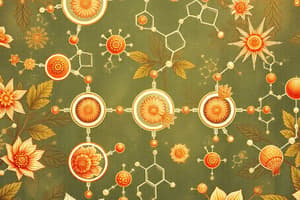Podcast
Questions and Answers
What is the Greek origin of the word 'chemical'?
What is the Greek origin of the word 'chemical'?
- Carbon, meaning 'matter'
- Chemis, meaning 'molecular'
- Chemia, meaning 'atom'
- Chymos, meaning 'juice' or 'liquid' (correct)
What defines organic compounds?
What defines organic compounds?
- They contain carbon atoms bonded to oxygen and nitrogen
- They contain carbon atoms bonded only to oxygen
- They contain carbon atoms bonded to other carbon atoms only
- They contain carbon atoms bonded to hydrogen and other elements (correct)
What type of compounds contain a benzene ring?
What type of compounds contain a benzene ring?
- Ketones
- Alcohols
- Aldehydes
- Aromatic compounds (correct)
Which compound contains a hydroxyl group (-OH) attached to a carbon atom?
Which compound contains a hydroxyl group (-OH) attached to a carbon atom?
Which compound contains a carbonyl group (-C=O) attached to a carbon atom?
Which compound contains a carbonyl group (-C=O) attached to a carbon atom?
What elements are commonly found in organic compounds?
What elements are commonly found in organic compounds?
Which functional group is formed when an amine reacts with a carboxylic acid?
Which functional group is formed when an amine reacts with a carboxylic acid?
What type of bond occurs when atoms share electrons?
What type of bond occurs when atoms share electrons?
Which compound is an example of an ester?
Which compound is an example of an ester?
What causes atoms to come together to form molecules?
What causes atoms to come together to form molecules?
Which factor determines the strength of a chemical bond?
Which factor determines the strength of a chemical bond?
What type of bond is formed between atoms having a large difference in electronegativity?
What type of bond is formed between atoms having a large difference in electronegativity?
Which organic compound is commonly used as a fuel in some cars?
Which organic compound is commonly used as a fuel in some cars?
What is the chemical composition of an ester functional group?
What is the chemical composition of an ester functional group?
Flashcards are hidden until you start studying
Study Notes
Chemical and Its Compounds
Chemistry is the study of matter, its properties, its composition, and the changes it undergoes. It is a natural science that deals with the behavior of substances at the molecular and atomic levels. The word "chemical" comes from the Greek word "chymos," which means "juice" or "liquid." The field of chemistry is incredibly diverse, with a wide range of subtopics that can be explored. In this article, we will focus on organic compounds and chemical bonding.
Organic Compounds
Organic compounds are substances that contain carbon atoms and are usually derived from living organisms. They are characterized by the presence of carbon atoms bonded to hydrogen atoms, as well as other elements such as oxygen, nitrogen, and sulfur. Some common organic compounds include:
- Alcohols: These are compounds that contain a hydroxyl group (-OH) attached to a carbon atom. Examples include ethanol (ethyl alcohol) and methanol (methyl alcohol).
- Aldehydes and Ketones: These are compounds that contain a carbonyl group (-C=O) attached to a carbon atom. Examples include acetaldehyde and acetone.
- Aromatic Compounds: These are compounds that contain a benzene ring, which is a six-carbon ring with alternating double and single bonds. Examples include benzene and toluene.
- Esters: These are compounds that contain an ester functional group (-O-CO-R), which is formed when an alcohol reacts with a carboxylic acid. Examples include ethyl acetate and methyl salicylate.
- Amides: These are compounds that contain an amide functional group (-CONH-), which is formed when an amine reacts with a carboxylic acid. Examples include acetamide and N-methylacetamide.
Organic compounds are essential to our daily lives, as they are used in a wide range of products, including food, medicine, and fuel. For example, ethanol is used as a fuel in some cars, while acetaminophen is a common pain reliever.
Chemical Bonding
Chemical bonding refers to the attractive forces that exist between atoms, which cause them to come together to form molecules. There are two main types of chemical bonds:
- Ionic Bond: This occurs when one atom donates an electron to another atom, forming a stable compound. Ionic bonds are formed between atoms that have a large difference in electronegativity, such as sodium and chlorine.
- Covalent Bond: This occurs when atoms share electrons, creating a stable compound. Covalent bonds are formed between atoms that have a similar electronegativity, such as hydrogen and oxygen.
The strength of a chemical bond depends on several factors, including the types of atoms involved, the distance between the atoms, and the energy required to break the bond. The strength of an ionic bond is generally higher than that of a covalent bond, as ionic bonds require more energy to break due to the charged nature of the ions.
In conclusion, chemistry is a fascinating field that deals with the properties and composition of matter. Organic compounds, which are derived from living organisms, play a crucial role in our daily lives. Chemical bonding, which is the force that holds atoms together, is essential for the formation of molecules and the stability of compounds. Understanding these concepts can help us appreciate the complexity and beauty of the chemical world.
Studying That Suits You
Use AI to generate personalized quizzes and flashcards to suit your learning preferences.




